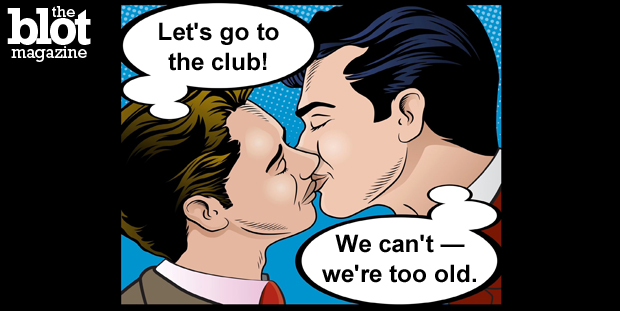
It’s rare that I’m actually asked to write about something, much less respond to another writer. Nevertheless, an older gay man, a friend and former colleague, posted to my Facebook wall Dalton Heinrich’s article “Gay Men and the Curse of the Peter Pan Syndrome” (Fair warning: The writer looks like someone named Dalton Heinrich would look like). Heinrich’s article is about a year old at this point, but still it manages to resurface from time to time, lunging at us like some sort of B-list horror-film monster we all thought was sufficiently killed off in the last scene (deep breathing … we’re safe, Camp Crystal Lake has seen the last of … wait … no … here it comes again … sigh).
So what makes Heinrich’s article so monstrous? Basically, he’s saying gay men over 30 should stay out of bars and clubs. In full disclosure, I’m a 38-year-old gay man. So, clubs? Check. Haven’t been in one in years. Bars? Get real. But let’s let Heinrich speak for himself:
The sad, thirsty man haunting the shadows of 18 and up clubs is slowly killing our culture. When my generation of gays gets older are we going to think that is the normal thing to do with our nights? Are we all destined to be ghosts of our youth, dramatically hunting down a thrill rather than being man enough and brave enough to go toward the light and move on to actually being an adult?
This is such a tiresome and frankly dangerous mode of thinking. And what’s more insulting about Heinrich’s words is that they resurfaced during Pride Month, our annual celebration of what it means to be us. And please don’t get me wrong, my words are here are not meant to be a “back in my day … respect your elders … we busted our butts so you could do what you want to with yours …” In further disclosure, I’m a historian and lead a semi-annual walking tour of Washington, D.C.’s Dupont Circle neighborhood, that seminal spot in our nation’s capital that was the scene of so much social and political LGBT history.
When giving the tour, at times, I have to hide my astonishment at younger gay men walking with me when the ideas and events I highlight seem so foreign to them. We talk about the evolution of Pride, from its humble beginnings to its city-wide, corporate brought-to-you-by sponsorship we see today. We talk about how, during the 1970s, simply showing up at Pride was a subversive political act. We pass by a gay bar nestled off of P Street, now shuttered, that had two staircases, one leading to an alley exit in case police busted up the bar so patrons had another way of getting out. We talk about Pride during the 1980s and height of the AIDS crisis and how the focus shifted from politics to matters of life and death. I show them a photograph of an ambulance board from a local Washington hospital, written in chalk where addresses of known people with AIDS was posted so that ambulance drivers would know not to go there in case they called for help.

My point? Pride was not always a party, but certainly now it’s a well-earned party. And we must remember this. Many social activists are predicting that the impending Supreme Court decision on gay marriage, due any day now, may very well be one of the biggest days of our lives. That is, if you’re paying attention, and if you have some idea of what this road to here looked liked.
Our queer past helps inform our queer present. To be totally divorced from the former makes the latter shallow and superficial, not to mention utterly boring. As for who should and should not be in gay bars, maybe Heinrich should stay in and read more. It’s gay men over a certain age that have certainly earned a drink at this point.
Brock Thompson is a contributing journalist for TheBlot Magazine.





